Organizational Behaviour and Leadership: Richer Sounds Report
VerifiedAdded on 2023/01/05
|16
|4495
|78
Report
AI Summary
This report provides a comprehensive analysis of the organizational behaviour at Richer Sounds, a hi-fi equipment company that expanded into a megastore. The report examines the impact of organizational culture, power dynamics, politics, and motivation on employee performance and overall company success. It explores these aspects through the lens of various organizational behaviour theories, including Handy’s Topology, Hofstede’s Model, and French and Raven’s sources of power. The report also evaluates team effectiveness, discussing barriers to effective teamwork and applying Tuckman’s five stages of team development. The analysis highlights Richer Sounds' employee-friendly environment, decentralized power structure, and emphasis on employee well-being, as well as providing recommendations for improving the company’s overall performance.
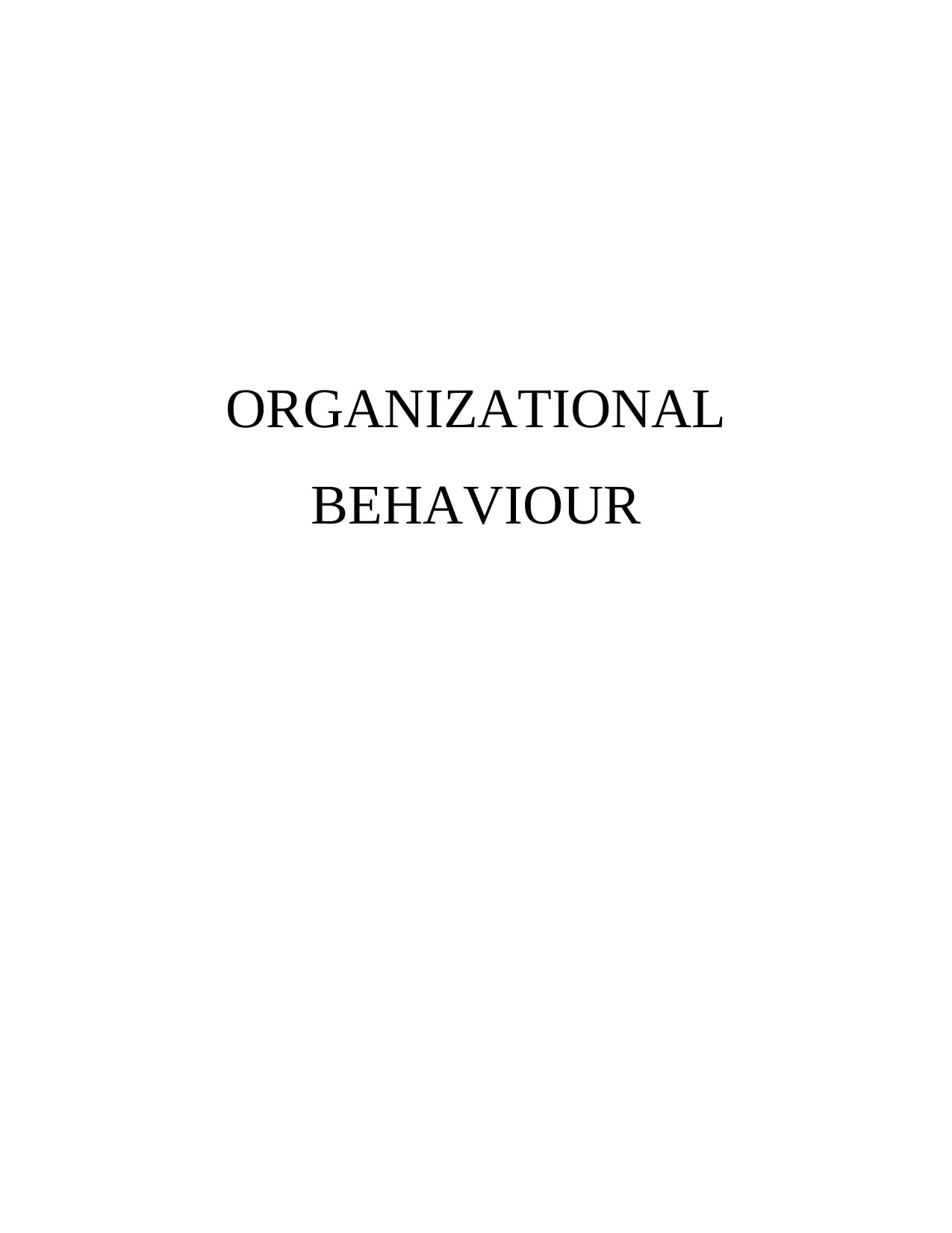
ORGANIZATIONAL
BEHAVIOUR
BEHAVIOUR
Paraphrase This Document
Need a fresh take? Get an instant paraphrase of this document with our AI Paraphraser
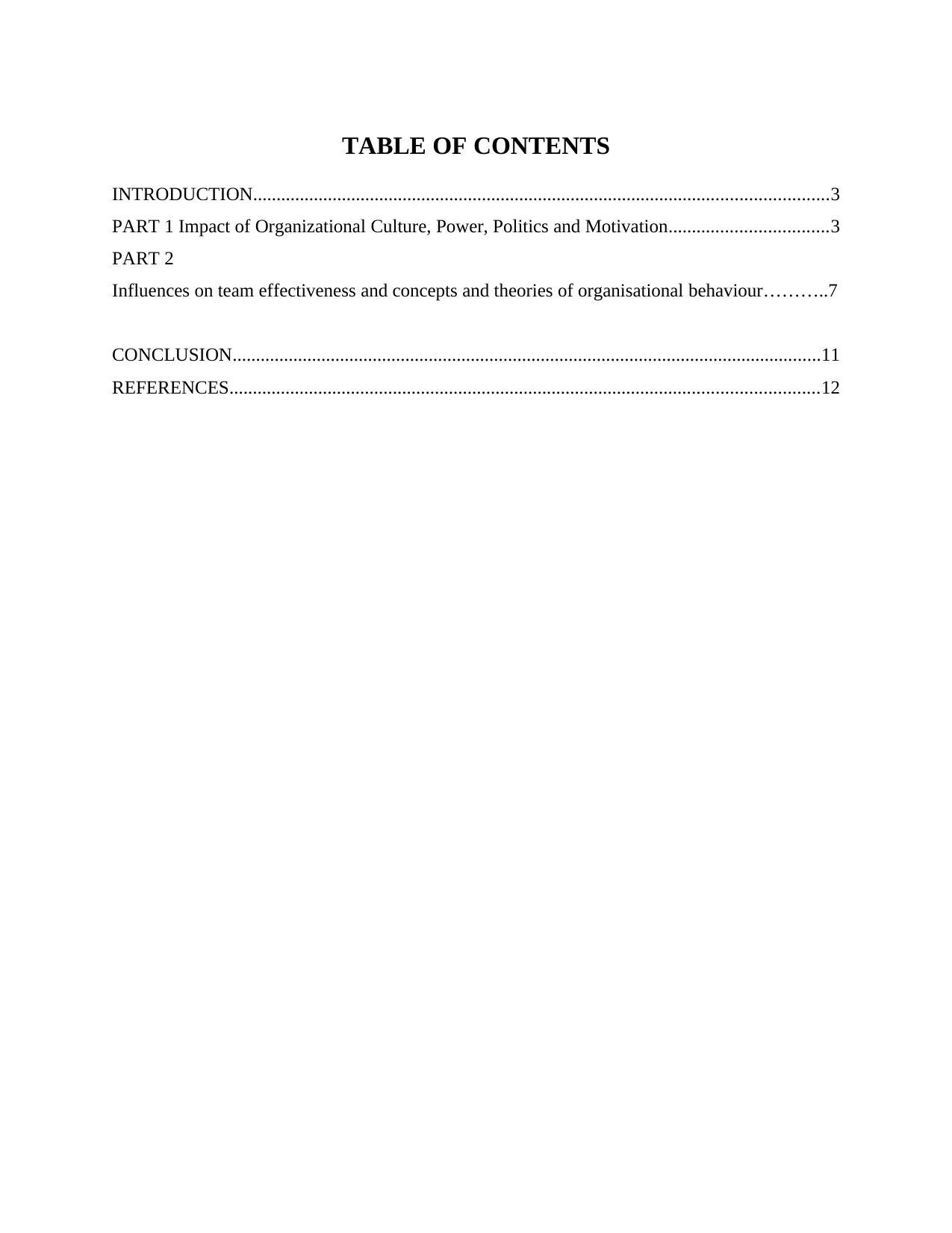
TABLE OF CONTENTS
INTRODUCTION...........................................................................................................................3
PART 1 Impact of Organizational Culture, Power, Politics and Motivation..................................3
PART 2
Influences on team effectiveness and concepts and theories of organisational behaviour………..7
CONCLUSION..............................................................................................................................11
REFERENCES..............................................................................................................................12
INTRODUCTION...........................................................................................................................3
PART 1 Impact of Organizational Culture, Power, Politics and Motivation..................................3
PART 2
Influences on team effectiveness and concepts and theories of organisational behaviour………..7
CONCLUSION..............................................................................................................................11
REFERENCES..............................................................................................................................12
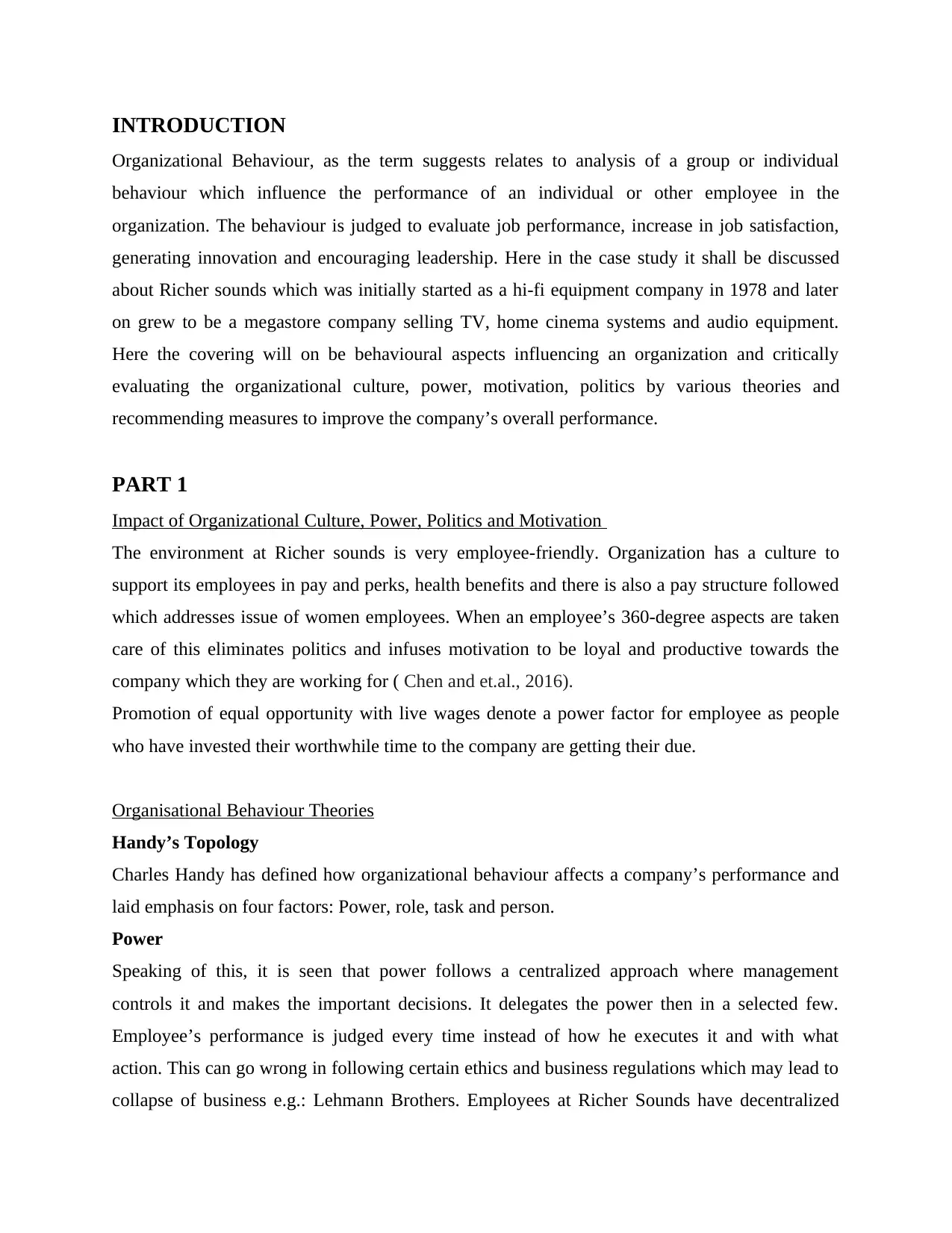
INTRODUCTION
Organizational Behaviour, as the term suggests relates to analysis of a group or individual
behaviour which influence the performance of an individual or other employee in the
organization. The behaviour is judged to evaluate job performance, increase in job satisfaction,
generating innovation and encouraging leadership. Here in the case study it shall be discussed
about Richer sounds which was initially started as a hi-fi equipment company in 1978 and later
on grew to be a megastore company selling TV, home cinema systems and audio equipment.
Here the covering will on be behavioural aspects influencing an organization and critically
evaluating the organizational culture, power, motivation, politics by various theories and
recommending measures to improve the company’s overall performance.
PART 1
Impact of Organizational Culture, Power, Politics and Motivation
The environment at Richer sounds is very employee-friendly. Organization has a culture to
support its employees in pay and perks, health benefits and there is also a pay structure followed
which addresses issue of women employees. When an employee’s 360-degree aspects are taken
care of this eliminates politics and infuses motivation to be loyal and productive towards the
company which they are working for ( Chen and et.al., 2016).
Promotion of equal opportunity with live wages denote a power factor for employee as people
who have invested their worthwhile time to the company are getting their due.
Organisational Behaviour Theories
Handy’s Topology
Charles Handy has defined how organizational behaviour affects a company’s performance and
laid emphasis on four factors: Power, role, task and person.
Power
Speaking of this, it is seen that power follows a centralized approach where management
controls it and makes the important decisions. It delegates the power then in a selected few.
Employee’s performance is judged every time instead of how he executes it and with what
action. This can go wrong in following certain ethics and business regulations which may lead to
collapse of business e.g.: Lehmann Brothers. Employees at Richer Sounds have decentralized
Organizational Behaviour, as the term suggests relates to analysis of a group or individual
behaviour which influence the performance of an individual or other employee in the
organization. The behaviour is judged to evaluate job performance, increase in job satisfaction,
generating innovation and encouraging leadership. Here in the case study it shall be discussed
about Richer sounds which was initially started as a hi-fi equipment company in 1978 and later
on grew to be a megastore company selling TV, home cinema systems and audio equipment.
Here the covering will on be behavioural aspects influencing an organization and critically
evaluating the organizational culture, power, motivation, politics by various theories and
recommending measures to improve the company’s overall performance.
PART 1
Impact of Organizational Culture, Power, Politics and Motivation
The environment at Richer sounds is very employee-friendly. Organization has a culture to
support its employees in pay and perks, health benefits and there is also a pay structure followed
which addresses issue of women employees. When an employee’s 360-degree aspects are taken
care of this eliminates politics and infuses motivation to be loyal and productive towards the
company which they are working for ( Chen and et.al., 2016).
Promotion of equal opportunity with live wages denote a power factor for employee as people
who have invested their worthwhile time to the company are getting their due.
Organisational Behaviour Theories
Handy’s Topology
Charles Handy has defined how organizational behaviour affects a company’s performance and
laid emphasis on four factors: Power, role, task and person.
Power
Speaking of this, it is seen that power follows a centralized approach where management
controls it and makes the important decisions. It delegates the power then in a selected few.
Employee’s performance is judged every time instead of how he executes it and with what
action. This can go wrong in following certain ethics and business regulations which may lead to
collapse of business e.g.: Lehmann Brothers. Employees at Richer Sounds have decentralized
⊘ This is a preview!⊘
Do you want full access?
Subscribe today to unlock all pages.

Trusted by 1+ million students worldwide
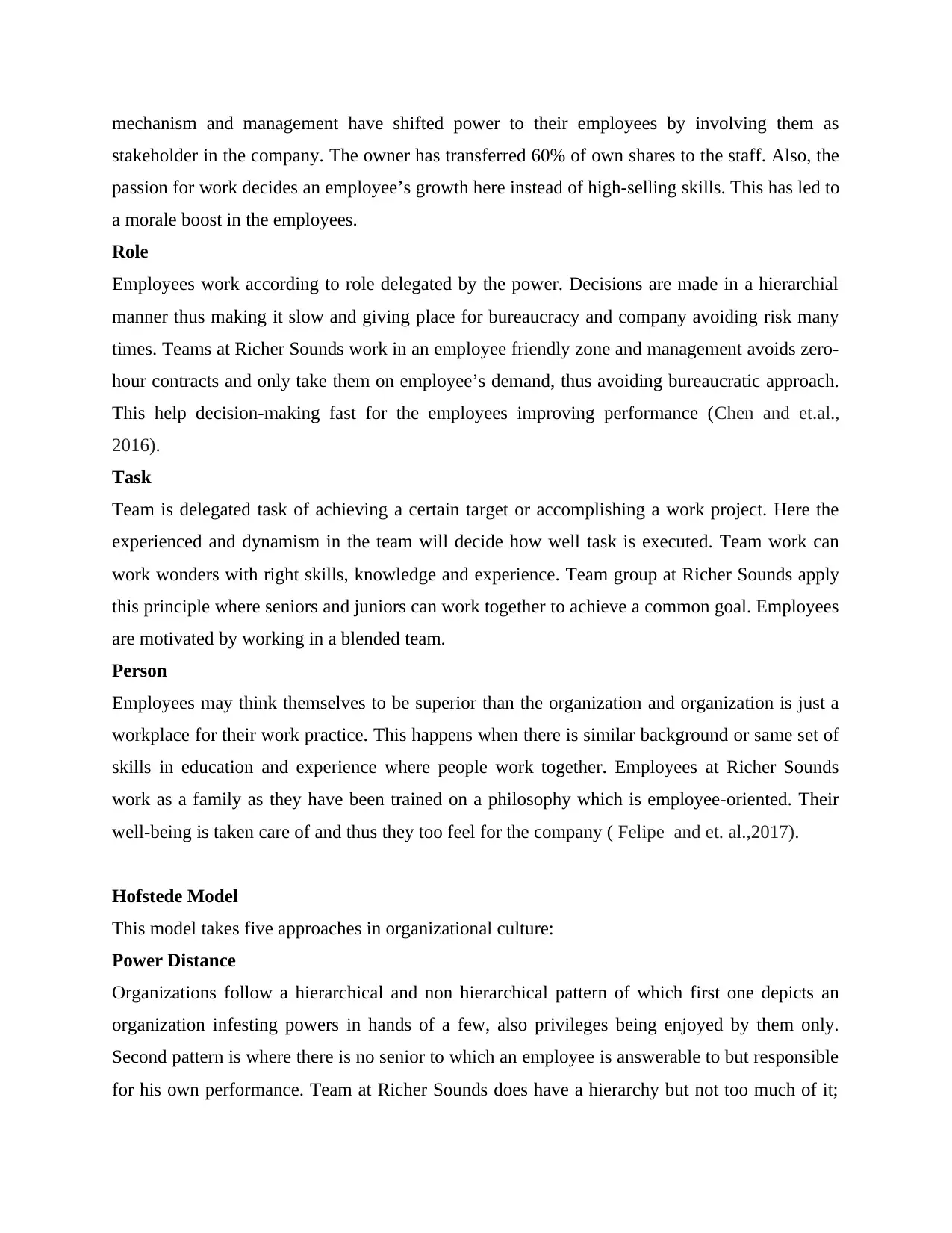
mechanism and management have shifted power to their employees by involving them as
stakeholder in the company. The owner has transferred 60% of own shares to the staff. Also, the
passion for work decides an employee’s growth here instead of high-selling skills. This has led to
a morale boost in the employees.
Role
Employees work according to role delegated by the power. Decisions are made in a hierarchial
manner thus making it slow and giving place for bureaucracy and company avoiding risk many
times. Teams at Richer Sounds work in an employee friendly zone and management avoids zero-
hour contracts and only take them on employee’s demand, thus avoiding bureaucratic approach.
This help decision-making fast for the employees improving performance (Chen and et.al.,
2016).
Task
Team is delegated task of achieving a certain target or accomplishing a work project. Here the
experienced and dynamism in the team will decide how well task is executed. Team work can
work wonders with right skills, knowledge and experience. Team group at Richer Sounds apply
this principle where seniors and juniors can work together to achieve a common goal. Employees
are motivated by working in a blended team.
Person
Employees may think themselves to be superior than the organization and organization is just a
workplace for their work practice. This happens when there is similar background or same set of
skills in education and experience where people work together. Employees at Richer Sounds
work as a family as they have been trained on a philosophy which is employee-oriented. Their
well-being is taken care of and thus they too feel for the company ( Felipe and et. al.,2017).
Hofstede Model
This model takes five approaches in organizational culture:
Power Distance
Organizations follow a hierarchical and non hierarchical pattern of which first one depicts an
organization infesting powers in hands of a few, also privileges being enjoyed by them only.
Second pattern is where there is no senior to which an employee is answerable to but responsible
for his own performance. Team at Richer Sounds does have a hierarchy but not too much of it;
stakeholder in the company. The owner has transferred 60% of own shares to the staff. Also, the
passion for work decides an employee’s growth here instead of high-selling skills. This has led to
a morale boost in the employees.
Role
Employees work according to role delegated by the power. Decisions are made in a hierarchial
manner thus making it slow and giving place for bureaucracy and company avoiding risk many
times. Teams at Richer Sounds work in an employee friendly zone and management avoids zero-
hour contracts and only take them on employee’s demand, thus avoiding bureaucratic approach.
This help decision-making fast for the employees improving performance (Chen and et.al.,
2016).
Task
Team is delegated task of achieving a certain target or accomplishing a work project. Here the
experienced and dynamism in the team will decide how well task is executed. Team work can
work wonders with right skills, knowledge and experience. Team group at Richer Sounds apply
this principle where seniors and juniors can work together to achieve a common goal. Employees
are motivated by working in a blended team.
Person
Employees may think themselves to be superior than the organization and organization is just a
workplace for their work practice. This happens when there is similar background or same set of
skills in education and experience where people work together. Employees at Richer Sounds
work as a family as they have been trained on a philosophy which is employee-oriented. Their
well-being is taken care of and thus they too feel for the company ( Felipe and et. al.,2017).
Hofstede Model
This model takes five approaches in organizational culture:
Power Distance
Organizations follow a hierarchical and non hierarchical pattern of which first one depicts an
organization infesting powers in hands of a few, also privileges being enjoyed by them only.
Second pattern is where there is no senior to which an employee is answerable to but responsible
for his own performance. Team at Richer Sounds does have a hierarchy but not too much of it;
Paraphrase This Document
Need a fresh take? Get an instant paraphrase of this document with our AI Paraphraser
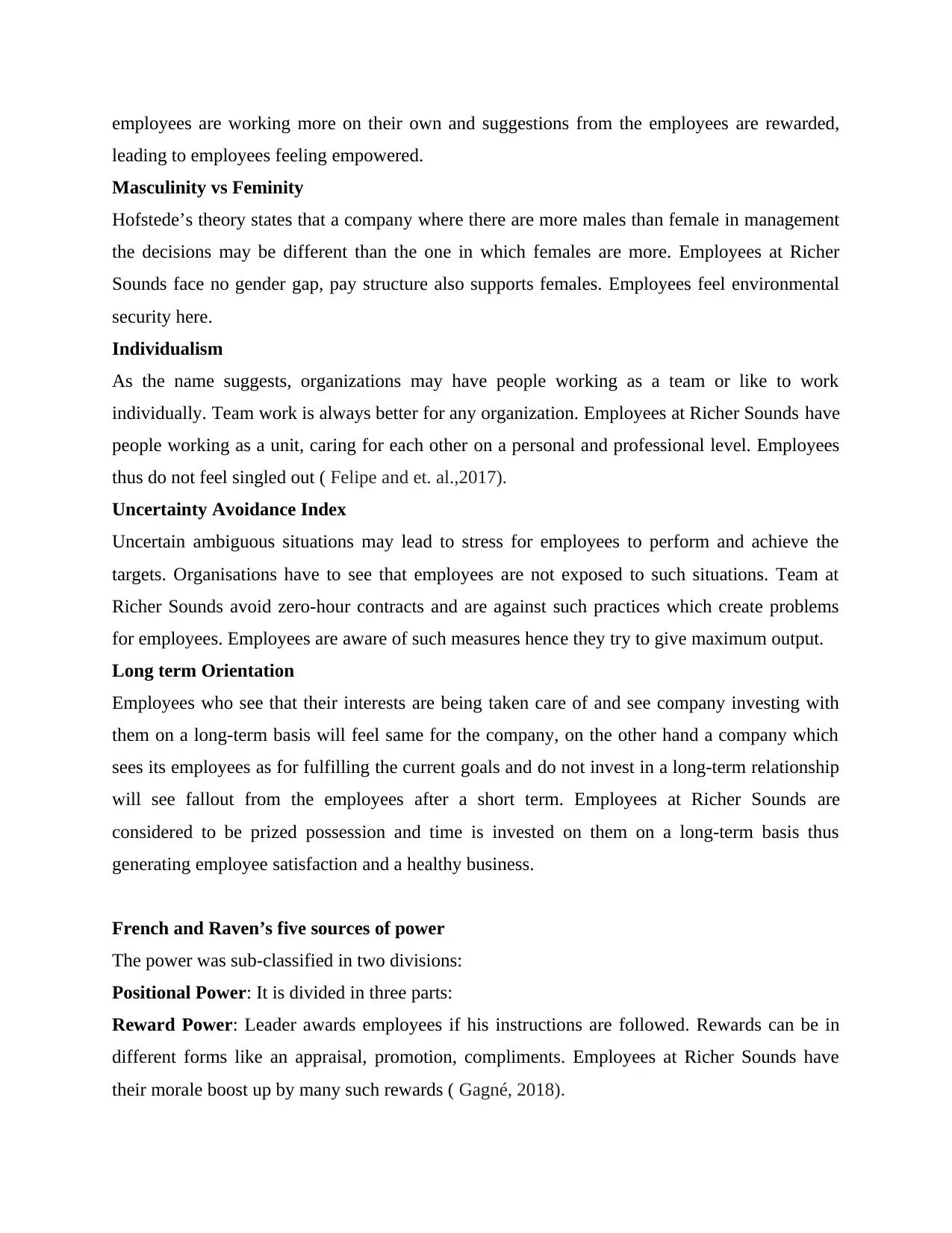
employees are working more on their own and suggestions from the employees are rewarded,
leading to employees feeling empowered.
Masculinity vs Feminity
Hofstede’s theory states that a company where there are more males than female in management
the decisions may be different than the one in which females are more. Employees at Richer
Sounds face no gender gap, pay structure also supports females. Employees feel environmental
security here.
Individualism
As the name suggests, organizations may have people working as a team or like to work
individually. Team work is always better for any organization. Employees at Richer Sounds have
people working as a unit, caring for each other on a personal and professional level. Employees
thus do not feel singled out ( Felipe and et. al.,2017).
Uncertainty Avoidance Index
Uncertain ambiguous situations may lead to stress for employees to perform and achieve the
targets. Organisations have to see that employees are not exposed to such situations. Team at
Richer Sounds avoid zero-hour contracts and are against such practices which create problems
for employees. Employees are aware of such measures hence they try to give maximum output.
Long term Orientation
Employees who see that their interests are being taken care of and see company investing with
them on a long-term basis will feel same for the company, on the other hand a company which
sees its employees as for fulfilling the current goals and do not invest in a long-term relationship
will see fallout from the employees after a short term. Employees at Richer Sounds are
considered to be prized possession and time is invested on them on a long-term basis thus
generating employee satisfaction and a healthy business.
French and Raven’s five sources of power
The power was sub-classified in two divisions:
Positional Power: It is divided in three parts:
Reward Power: Leader awards employees if his instructions are followed. Rewards can be in
different forms like an appraisal, promotion, compliments. Employees at Richer Sounds have
their morale boost up by many such rewards ( Gagné, 2018).
leading to employees feeling empowered.
Masculinity vs Feminity
Hofstede’s theory states that a company where there are more males than female in management
the decisions may be different than the one in which females are more. Employees at Richer
Sounds face no gender gap, pay structure also supports females. Employees feel environmental
security here.
Individualism
As the name suggests, organizations may have people working as a team or like to work
individually. Team work is always better for any organization. Employees at Richer Sounds have
people working as a unit, caring for each other on a personal and professional level. Employees
thus do not feel singled out ( Felipe and et. al.,2017).
Uncertainty Avoidance Index
Uncertain ambiguous situations may lead to stress for employees to perform and achieve the
targets. Organisations have to see that employees are not exposed to such situations. Team at
Richer Sounds avoid zero-hour contracts and are against such practices which create problems
for employees. Employees are aware of such measures hence they try to give maximum output.
Long term Orientation
Employees who see that their interests are being taken care of and see company investing with
them on a long-term basis will feel same for the company, on the other hand a company which
sees its employees as for fulfilling the current goals and do not invest in a long-term relationship
will see fallout from the employees after a short term. Employees at Richer Sounds are
considered to be prized possession and time is invested on them on a long-term basis thus
generating employee satisfaction and a healthy business.
French and Raven’s five sources of power
The power was sub-classified in two divisions:
Positional Power: It is divided in three parts:
Reward Power: Leader awards employees if his instructions are followed. Rewards can be in
different forms like an appraisal, promotion, compliments. Employees at Richer Sounds have
their morale boost up by many such rewards ( Gagné, 2018).
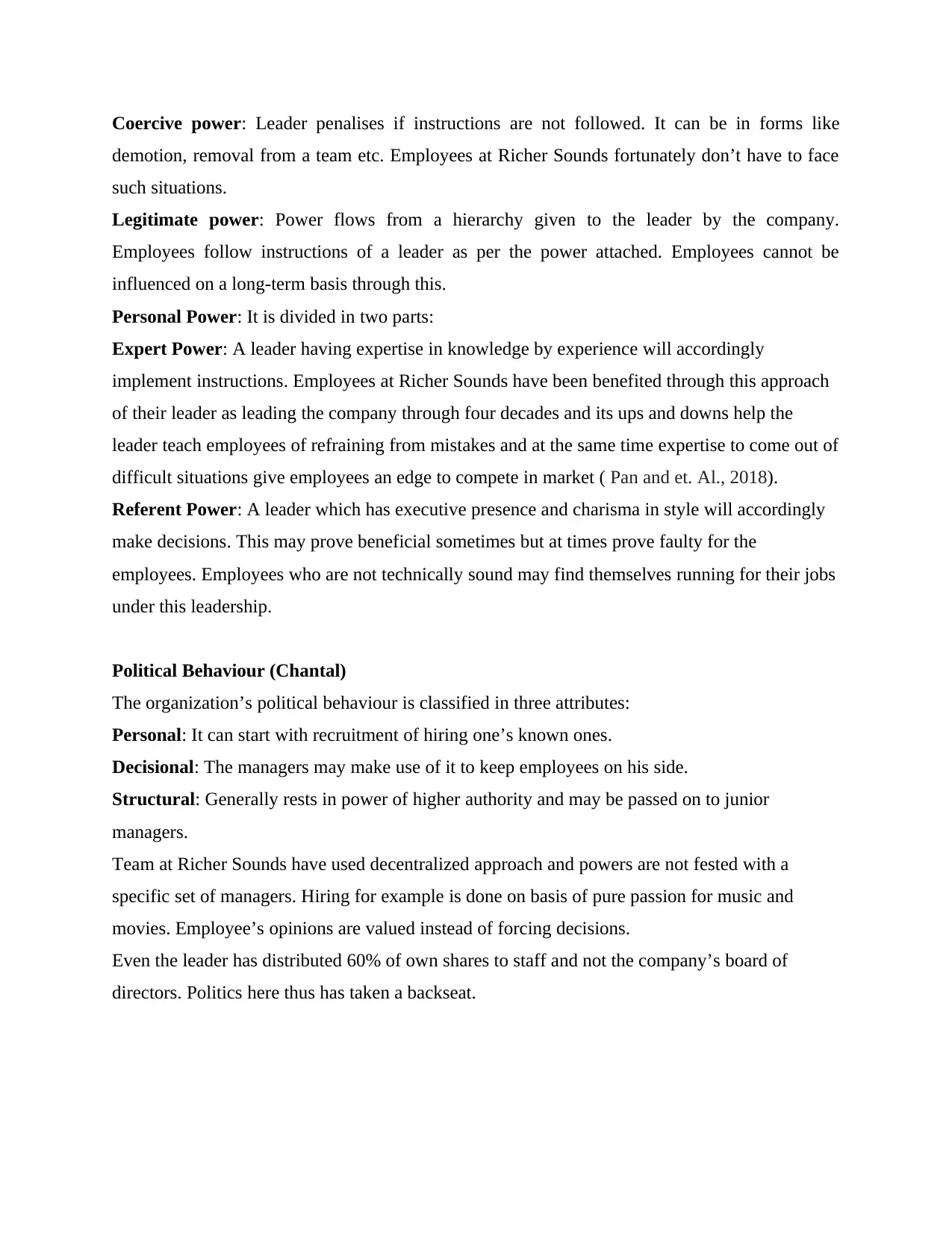
Coercive power: Leader penalises if instructions are not followed. It can be in forms like
demotion, removal from a team etc. Employees at Richer Sounds fortunately don’t have to face
such situations.
Legitimate power: Power flows from a hierarchy given to the leader by the company.
Employees follow instructions of a leader as per the power attached. Employees cannot be
influenced on a long-term basis through this.
Personal Power: It is divided in two parts:
Expert Power: A leader having expertise in knowledge by experience will accordingly
implement instructions. Employees at Richer Sounds have been benefited through this approach
of their leader as leading the company through four decades and its ups and downs help the
leader teach employees of refraining from mistakes and at the same time expertise to come out of
difficult situations give employees an edge to compete in market ( Pan and et. Al., 2018).
Referent Power: A leader which has executive presence and charisma in style will accordingly
make decisions. This may prove beneficial sometimes but at times prove faulty for the
employees. Employees who are not technically sound may find themselves running for their jobs
under this leadership.
Political Behaviour (Chantal)
The organization’s political behaviour is classified in three attributes:
Personal: It can start with recruitment of hiring one’s known ones.
Decisional: The managers may make use of it to keep employees on his side.
Structural: Generally rests in power of higher authority and may be passed on to junior
managers.
Team at Richer Sounds have used decentralized approach and powers are not fested with a
specific set of managers. Hiring for example is done on basis of pure passion for music and
movies. Employee’s opinions are valued instead of forcing decisions.
Even the leader has distributed 60% of own shares to staff and not the company’s board of
directors. Politics here thus has taken a backseat.
demotion, removal from a team etc. Employees at Richer Sounds fortunately don’t have to face
such situations.
Legitimate power: Power flows from a hierarchy given to the leader by the company.
Employees follow instructions of a leader as per the power attached. Employees cannot be
influenced on a long-term basis through this.
Personal Power: It is divided in two parts:
Expert Power: A leader having expertise in knowledge by experience will accordingly
implement instructions. Employees at Richer Sounds have been benefited through this approach
of their leader as leading the company through four decades and its ups and downs help the
leader teach employees of refraining from mistakes and at the same time expertise to come out of
difficult situations give employees an edge to compete in market ( Pan and et. Al., 2018).
Referent Power: A leader which has executive presence and charisma in style will accordingly
make decisions. This may prove beneficial sometimes but at times prove faulty for the
employees. Employees who are not technically sound may find themselves running for their jobs
under this leadership.
Political Behaviour (Chantal)
The organization’s political behaviour is classified in three attributes:
Personal: It can start with recruitment of hiring one’s known ones.
Decisional: The managers may make use of it to keep employees on his side.
Structural: Generally rests in power of higher authority and may be passed on to junior
managers.
Team at Richer Sounds have used decentralized approach and powers are not fested with a
specific set of managers. Hiring for example is done on basis of pure passion for music and
movies. Employee’s opinions are valued instead of forcing decisions.
Even the leader has distributed 60% of own shares to staff and not the company’s board of
directors. Politics here thus has taken a backseat.
⊘ This is a preview!⊘
Do you want full access?
Subscribe today to unlock all pages.

Trusted by 1+ million students worldwide

PART 2
Influences on team effectiveness and concepts and theories of organisational behaviour
Team Effectiveness
Team is a group of individuals assigned a same set or different set of work but with a common
goal to achieve in a given time period. As the members of a team are from various cultural
backgrounds, education, experience some differences of opinions may arise. How these
differences are solved and the level of understanding and motivation is there in the team will
decide the efficiency and inefficiency of the team ( Pan and et. al., 2018).
Efficient team: They are those who work in unison with each other, are ready to understand
each other’s point of view or problems, are cooperative in lending help when required; the Team
leader here will be able to judge the competencies of every individual and assign tasks
accordingly. Efficient team always divide work into sub groups who report their progress to each
other as and when required and have a back-up for every individual. When this sort of team play
comes into work desired results are there to be seen.
Inefficient team: They are not organized from starting, rely on the fact that a lot of time is there
to achieve the target, do not lay much emphasis on other’s point of view, back-ups are not pre-
decided, are not in daily conversation with each other. Thus they are not able to achieve their
targets.
Barriers to effective team behaviour
People do not have clarity where to begin, how to go about a new task and how to schedule it.
Some employees have dominating nature and want their say in how things should be done. This
ca give rise to conflict among team. Like every team, there would be a section which is not
performing well. Richer Sounds give good training and briefing about new tasks at hand. People
are promoted to have a say in how things can be done which lays to side conflict. Weak
performers are encouraged to find out where they are lacking and need improvement ( Gagné,
2018).
Influences on team effectiveness and concepts and theories of organisational behaviour
Team Effectiveness
Team is a group of individuals assigned a same set or different set of work but with a common
goal to achieve in a given time period. As the members of a team are from various cultural
backgrounds, education, experience some differences of opinions may arise. How these
differences are solved and the level of understanding and motivation is there in the team will
decide the efficiency and inefficiency of the team ( Pan and et. al., 2018).
Efficient team: They are those who work in unison with each other, are ready to understand
each other’s point of view or problems, are cooperative in lending help when required; the Team
leader here will be able to judge the competencies of every individual and assign tasks
accordingly. Efficient team always divide work into sub groups who report their progress to each
other as and when required and have a back-up for every individual. When this sort of team play
comes into work desired results are there to be seen.
Inefficient team: They are not organized from starting, rely on the fact that a lot of time is there
to achieve the target, do not lay much emphasis on other’s point of view, back-ups are not pre-
decided, are not in daily conversation with each other. Thus they are not able to achieve their
targets.
Barriers to effective team behaviour
People do not have clarity where to begin, how to go about a new task and how to schedule it.
Some employees have dominating nature and want their say in how things should be done. This
ca give rise to conflict among team. Like every team, there would be a section which is not
performing well. Richer Sounds give good training and briefing about new tasks at hand. People
are promoted to have a say in how things can be done which lays to side conflict. Weak
performers are encouraged to find out where they are lacking and need improvement ( Gagné,
2018).
Paraphrase This Document
Need a fresh take? Get an instant paraphrase of this document with our AI Paraphraser
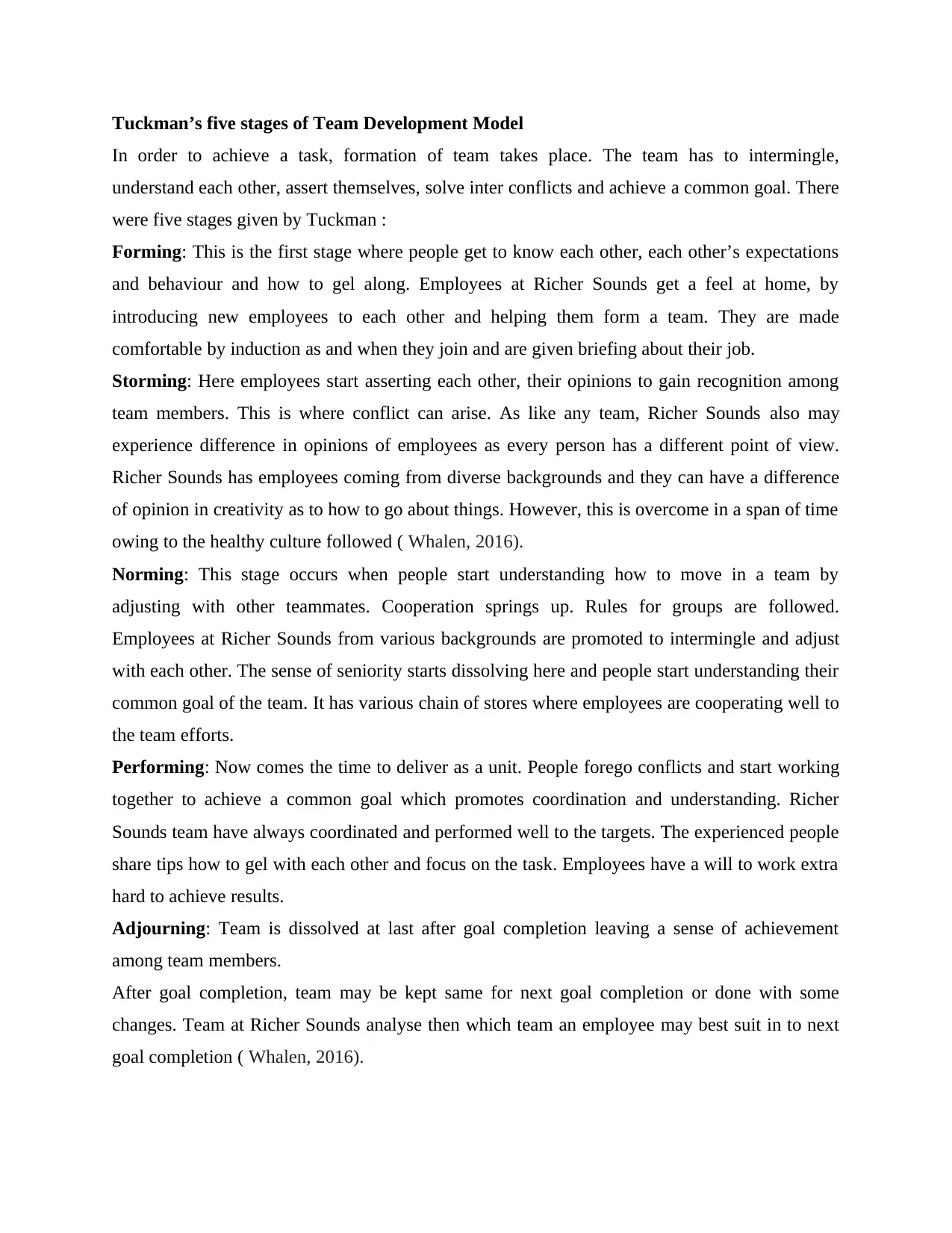
Tuckman’s five stages of Team Development Model
In order to achieve a task, formation of team takes place. The team has to intermingle,
understand each other, assert themselves, solve inter conflicts and achieve a common goal. There
were five stages given by Tuckman :
Forming: This is the first stage where people get to know each other, each other’s expectations
and behaviour and how to gel along. Employees at Richer Sounds get a feel at home, by
introducing new employees to each other and helping them form a team. They are made
comfortable by induction as and when they join and are given briefing about their job.
Storming: Here employees start asserting each other, their opinions to gain recognition among
team members. This is where conflict can arise. As like any team, Richer Sounds also may
experience difference in opinions of employees as every person has a different point of view.
Richer Sounds has employees coming from diverse backgrounds and they can have a difference
of opinion in creativity as to how to go about things. However, this is overcome in a span of time
owing to the healthy culture followed ( Whalen, 2016).
Norming: This stage occurs when people start understanding how to move in a team by
adjusting with other teammates. Cooperation springs up. Rules for groups are followed.
Employees at Richer Sounds from various backgrounds are promoted to intermingle and adjust
with each other. The sense of seniority starts dissolving here and people start understanding their
common goal of the team. It has various chain of stores where employees are cooperating well to
the team efforts.
Performing: Now comes the time to deliver as a unit. People forego conflicts and start working
together to achieve a common goal which promotes coordination and understanding. Richer
Sounds team have always coordinated and performed well to the targets. The experienced people
share tips how to gel with each other and focus on the task. Employees have a will to work extra
hard to achieve results.
Adjourning: Team is dissolved at last after goal completion leaving a sense of achievement
among team members.
After goal completion, team may be kept same for next goal completion or done with some
changes. Team at Richer Sounds analyse then which team an employee may best suit in to next
goal completion ( Whalen, 2016).
In order to achieve a task, formation of team takes place. The team has to intermingle,
understand each other, assert themselves, solve inter conflicts and achieve a common goal. There
were five stages given by Tuckman :
Forming: This is the first stage where people get to know each other, each other’s expectations
and behaviour and how to gel along. Employees at Richer Sounds get a feel at home, by
introducing new employees to each other and helping them form a team. They are made
comfortable by induction as and when they join and are given briefing about their job.
Storming: Here employees start asserting each other, their opinions to gain recognition among
team members. This is where conflict can arise. As like any team, Richer Sounds also may
experience difference in opinions of employees as every person has a different point of view.
Richer Sounds has employees coming from diverse backgrounds and they can have a difference
of opinion in creativity as to how to go about things. However, this is overcome in a span of time
owing to the healthy culture followed ( Whalen, 2016).
Norming: This stage occurs when people start understanding how to move in a team by
adjusting with other teammates. Cooperation springs up. Rules for groups are followed.
Employees at Richer Sounds from various backgrounds are promoted to intermingle and adjust
with each other. The sense of seniority starts dissolving here and people start understanding their
common goal of the team. It has various chain of stores where employees are cooperating well to
the team efforts.
Performing: Now comes the time to deliver as a unit. People forego conflicts and start working
together to achieve a common goal which promotes coordination and understanding. Richer
Sounds team have always coordinated and performed well to the targets. The experienced people
share tips how to gel with each other and focus on the task. Employees have a will to work extra
hard to achieve results.
Adjourning: Team is dissolved at last after goal completion leaving a sense of achievement
among team members.
After goal completion, team may be kept same for next goal completion or done with some
changes. Team at Richer Sounds analyse then which team an employee may best suit in to next
goal completion ( Whalen, 2016).
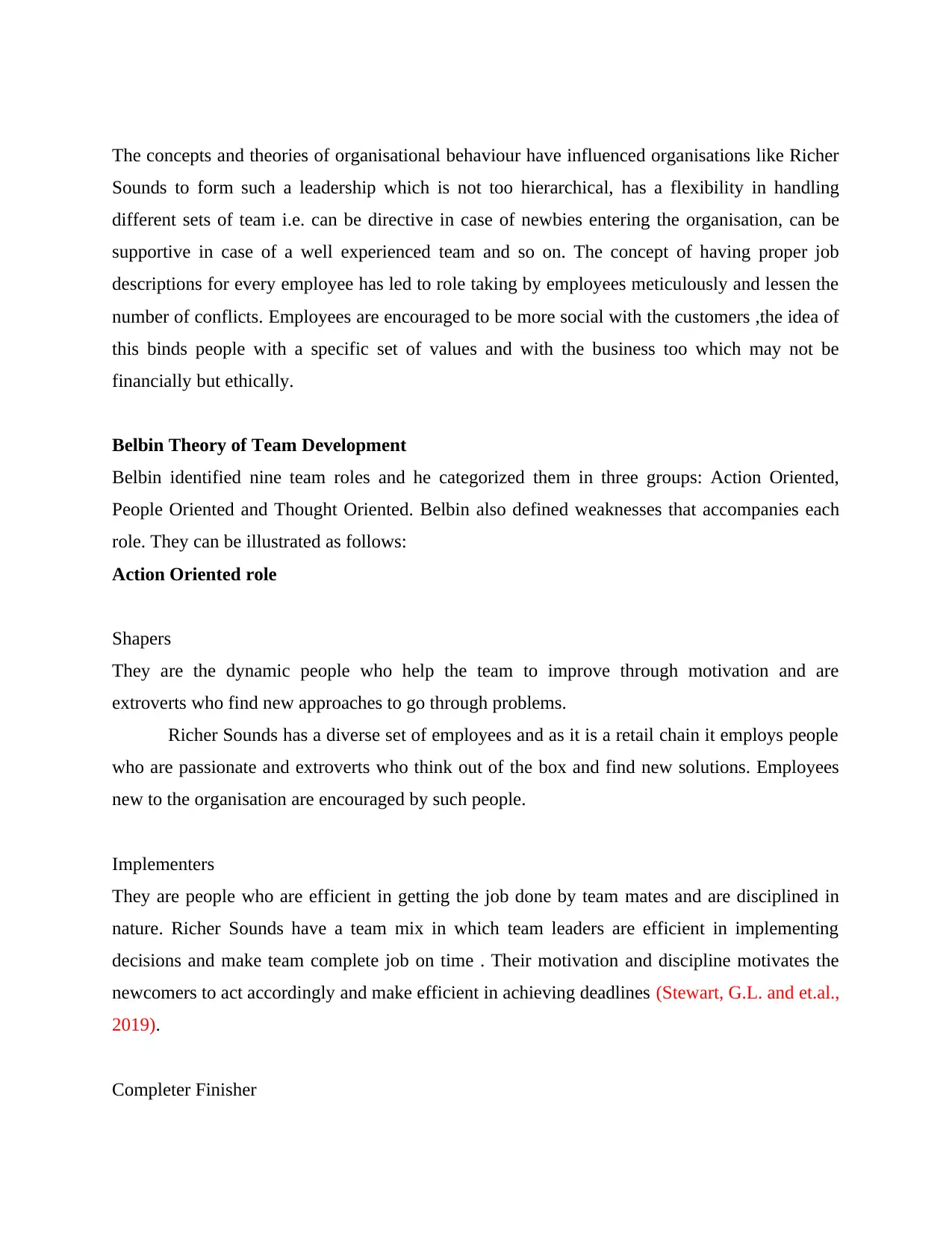
The concepts and theories of organisational behaviour have influenced organisations like Richer
Sounds to form such a leadership which is not too hierarchical, has a flexibility in handling
different sets of team i.e. can be directive in case of newbies entering the organisation, can be
supportive in case of a well experienced team and so on. The concept of having proper job
descriptions for every employee has led to role taking by employees meticulously and lessen the
number of conflicts. Employees are encouraged to be more social with the customers ,the idea of
this binds people with a specific set of values and with the business too which may not be
financially but ethically.
Belbin Theory of Team Development
Belbin identified nine team roles and he categorized them in three groups: Action Oriented,
People Oriented and Thought Oriented. Belbin also defined weaknesses that accompanies each
role. They can be illustrated as follows:
Action Oriented role
Shapers
They are the dynamic people who help the team to improve through motivation and are
extroverts who find new approaches to go through problems.
Richer Sounds has a diverse set of employees and as it is a retail chain it employs people
who are passionate and extroverts who think out of the box and find new solutions. Employees
new to the organisation are encouraged by such people.
Implementers
They are people who are efficient in getting the job done by team mates and are disciplined in
nature. Richer Sounds have a team mix in which team leaders are efficient in implementing
decisions and make team complete job on time . Their motivation and discipline motivates the
newcomers to act accordingly and make efficient in achieving deadlines (Stewart, G.L. and et.al.,
2019).
Completer Finisher
Sounds to form such a leadership which is not too hierarchical, has a flexibility in handling
different sets of team i.e. can be directive in case of newbies entering the organisation, can be
supportive in case of a well experienced team and so on. The concept of having proper job
descriptions for every employee has led to role taking by employees meticulously and lessen the
number of conflicts. Employees are encouraged to be more social with the customers ,the idea of
this binds people with a specific set of values and with the business too which may not be
financially but ethically.
Belbin Theory of Team Development
Belbin identified nine team roles and he categorized them in three groups: Action Oriented,
People Oriented and Thought Oriented. Belbin also defined weaknesses that accompanies each
role. They can be illustrated as follows:
Action Oriented role
Shapers
They are the dynamic people who help the team to improve through motivation and are
extroverts who find new approaches to go through problems.
Richer Sounds has a diverse set of employees and as it is a retail chain it employs people
who are passionate and extroverts who think out of the box and find new solutions. Employees
new to the organisation are encouraged by such people.
Implementers
They are people who are efficient in getting the job done by team mates and are disciplined in
nature. Richer Sounds have a team mix in which team leaders are efficient in implementing
decisions and make team complete job on time . Their motivation and discipline motivates the
newcomers to act accordingly and make efficient in achieving deadlines (Stewart, G.L. and et.al.,
2019).
Completer Finisher
⊘ This is a preview!⊘
Do you want full access?
Subscribe today to unlock all pages.

Trusted by 1+ million students worldwide
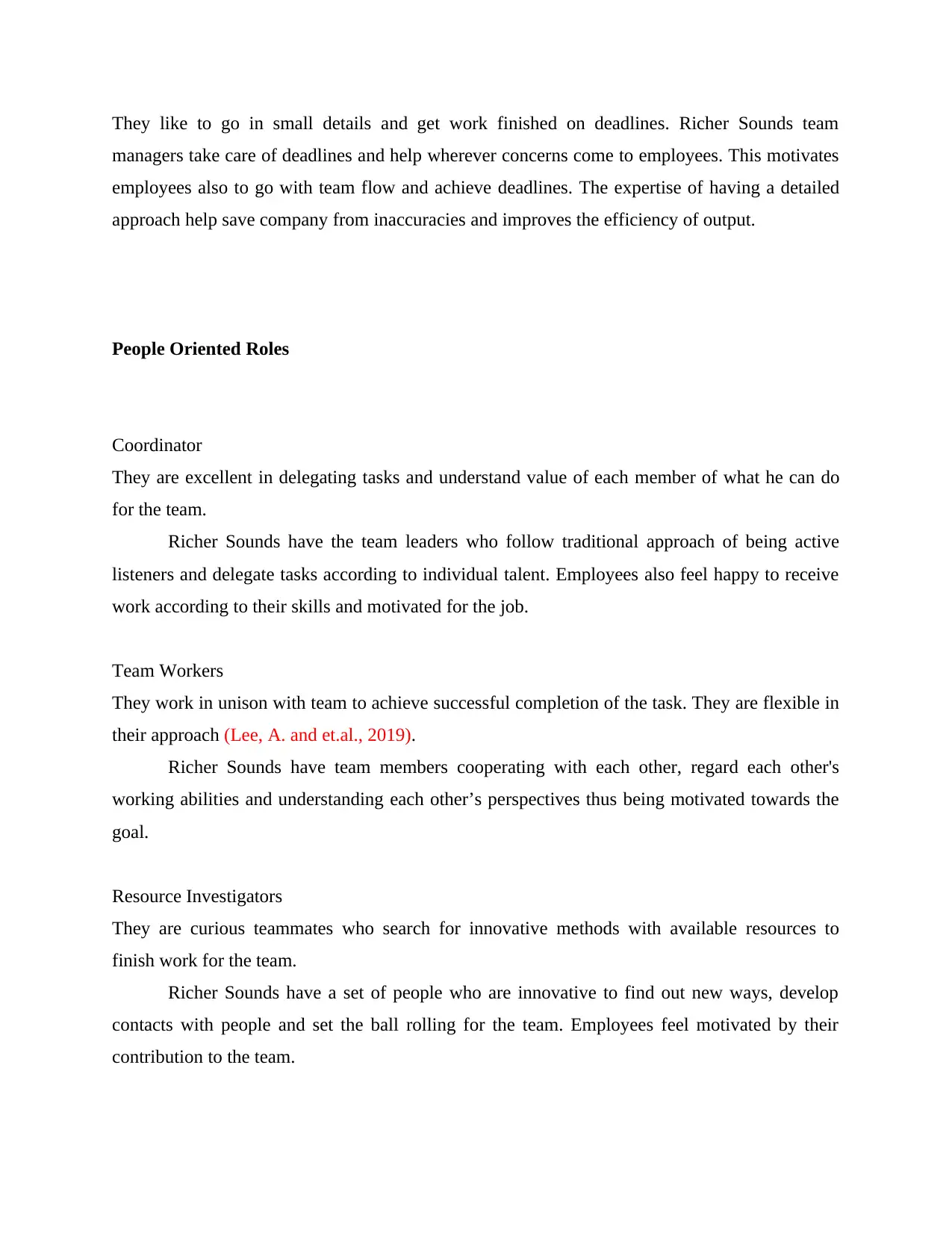
They like to go in small details and get work finished on deadlines. Richer Sounds team
managers take care of deadlines and help wherever concerns come to employees. This motivates
employees also to go with team flow and achieve deadlines. The expertise of having a detailed
approach help save company from inaccuracies and improves the efficiency of output.
People Oriented Roles
Coordinator
They are excellent in delegating tasks and understand value of each member of what he can do
for the team.
Richer Sounds have the team leaders who follow traditional approach of being active
listeners and delegate tasks according to individual talent. Employees also feel happy to receive
work according to their skills and motivated for the job.
Team Workers
They work in unison with team to achieve successful completion of the task. They are flexible in
their approach (Lee, A. and et.al., 2019).
Richer Sounds have team members cooperating with each other, regard each other's
working abilities and understanding each other’s perspectives thus being motivated towards the
goal.
Resource Investigators
They are curious teammates who search for innovative methods with available resources to
finish work for the team.
Richer Sounds have a set of people who are innovative to find out new ways, develop
contacts with people and set the ball rolling for the team. Employees feel motivated by their
contribution to the team.
managers take care of deadlines and help wherever concerns come to employees. This motivates
employees also to go with team flow and achieve deadlines. The expertise of having a detailed
approach help save company from inaccuracies and improves the efficiency of output.
People Oriented Roles
Coordinator
They are excellent in delegating tasks and understand value of each member of what he can do
for the team.
Richer Sounds have the team leaders who follow traditional approach of being active
listeners and delegate tasks according to individual talent. Employees also feel happy to receive
work according to their skills and motivated for the job.
Team Workers
They work in unison with team to achieve successful completion of the task. They are flexible in
their approach (Lee, A. and et.al., 2019).
Richer Sounds have team members cooperating with each other, regard each other's
working abilities and understanding each other’s perspectives thus being motivated towards the
goal.
Resource Investigators
They are curious teammates who search for innovative methods with available resources to
finish work for the team.
Richer Sounds have a set of people who are innovative to find out new ways, develop
contacts with people and set the ball rolling for the team. Employees feel motivated by their
contribution to the team.
Paraphrase This Document
Need a fresh take? Get an instant paraphrase of this document with our AI Paraphraser

Thought Oriented Roles
Plant
They are creative innovators who like to work alone to carve out new ideas for the team.
Team at Richer Sounds have a certain group who fall under this category and are
contributing in a silent way with their novel ideas. Employees feel betterment by using ideas of
people within their group.
Monitor-Evaluators
They are the people who analyse the ideas recommended by plant as mentioned above. They
carefully think how the idea can work for the team to achieve the goal (Wellin, 2016).
Richer Sounds have members who can analyse the ideas and mend them to suit demands of
given situation. They help in getting the idea moulded according to the needs of the company.
Employees get the benefit of use of flexible approach in implementation of ideas.
Specialist
As the name suggests, they have an expertise in a particular field and contribute to the team in
this manner.
Richer Sounds have experts working in the area to help clear hurdles and simplify
process for team to achieve the goal. Employees get an upper hand in task completion with help
of their expertise.
Impact of concepts and theories of Organisational Behaviour on Employees
Path Goal Theory
The leadership style which best suits the company’s employees in their way of working such that
they feel comfortable to discuss their problems with management and motivated to perform the
tasks well.
A leader must have the following characteristics:
Plant
They are creative innovators who like to work alone to carve out new ideas for the team.
Team at Richer Sounds have a certain group who fall under this category and are
contributing in a silent way with their novel ideas. Employees feel betterment by using ideas of
people within their group.
Monitor-Evaluators
They are the people who analyse the ideas recommended by plant as mentioned above. They
carefully think how the idea can work for the team to achieve the goal (Wellin, 2016).
Richer Sounds have members who can analyse the ideas and mend them to suit demands of
given situation. They help in getting the idea moulded according to the needs of the company.
Employees get the benefit of use of flexible approach in implementation of ideas.
Specialist
As the name suggests, they have an expertise in a particular field and contribute to the team in
this manner.
Richer Sounds have experts working in the area to help clear hurdles and simplify
process for team to achieve the goal. Employees get an upper hand in task completion with help
of their expertise.
Impact of concepts and theories of Organisational Behaviour on Employees
Path Goal Theory
The leadership style which best suits the company’s employees in their way of working such that
they feel comfortable to discuss their problems with management and motivated to perform the
tasks well.
A leader must have the following characteristics:
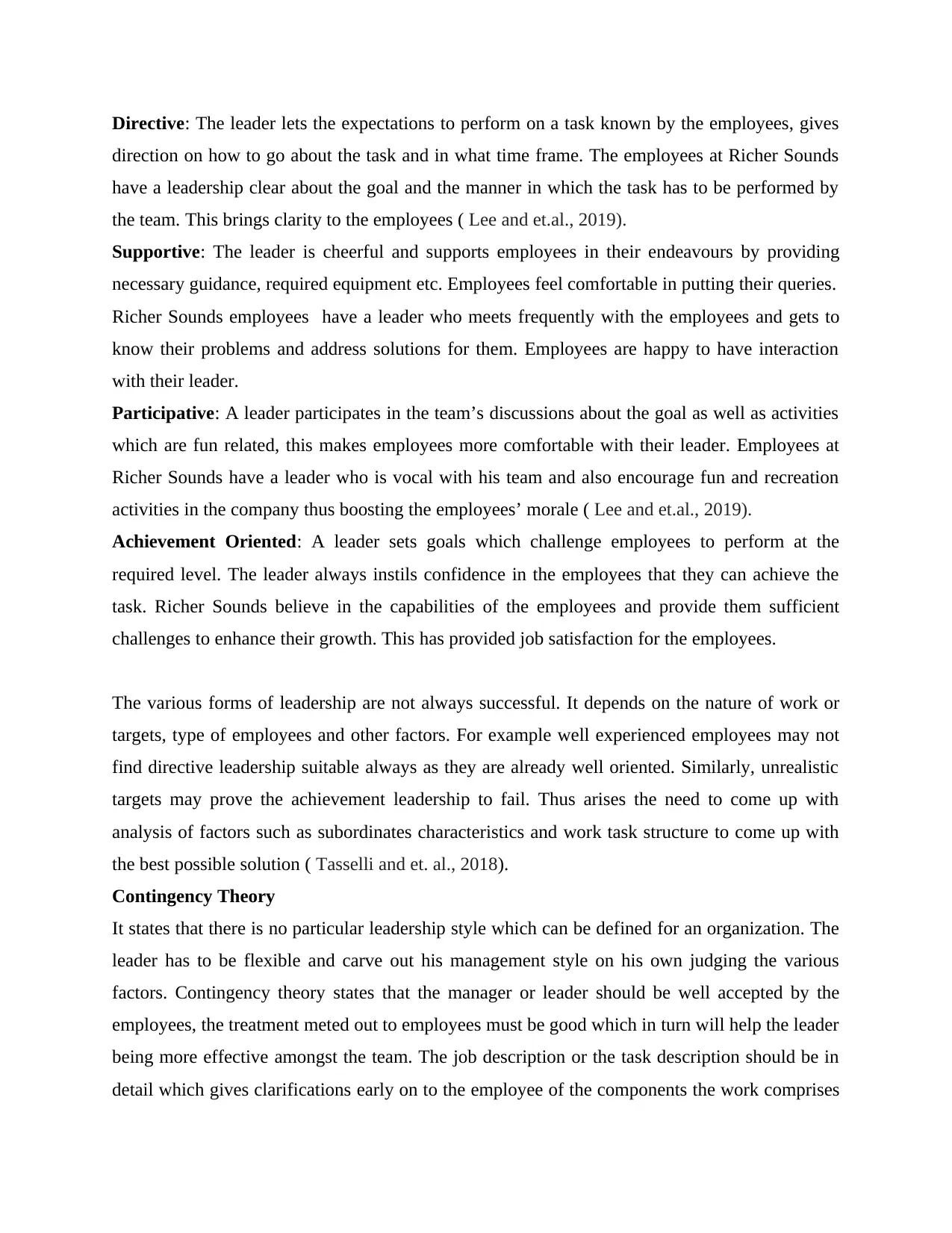
Directive: The leader lets the expectations to perform on a task known by the employees, gives
direction on how to go about the task and in what time frame. The employees at Richer Sounds
have a leadership clear about the goal and the manner in which the task has to be performed by
the team. This brings clarity to the employees ( Lee and et.al., 2019).
Supportive: The leader is cheerful and supports employees in their endeavours by providing
necessary guidance, required equipment etc. Employees feel comfortable in putting their queries.
Richer Sounds employees have a leader who meets frequently with the employees and gets to
know their problems and address solutions for them. Employees are happy to have interaction
with their leader.
Participative: A leader participates in the team’s discussions about the goal as well as activities
which are fun related, this makes employees more comfortable with their leader. Employees at
Richer Sounds have a leader who is vocal with his team and also encourage fun and recreation
activities in the company thus boosting the employees’ morale ( Lee and et.al., 2019).
Achievement Oriented: A leader sets goals which challenge employees to perform at the
required level. The leader always instils confidence in the employees that they can achieve the
task. Richer Sounds believe in the capabilities of the employees and provide them sufficient
challenges to enhance their growth. This has provided job satisfaction for the employees.
The various forms of leadership are not always successful. It depends on the nature of work or
targets, type of employees and other factors. For example well experienced employees may not
find directive leadership suitable always as they are already well oriented. Similarly, unrealistic
targets may prove the achievement leadership to fail. Thus arises the need to come up with
analysis of factors such as subordinates characteristics and work task structure to come up with
the best possible solution ( Tasselli and et. al., 2018).
Contingency Theory
It states that there is no particular leadership style which can be defined for an organization. The
leader has to be flexible and carve out his management style on his own judging the various
factors. Contingency theory states that the manager or leader should be well accepted by the
employees, the treatment meted out to employees must be good which in turn will help the leader
being more effective amongst the team. The job description or the task description should be in
detail which gives clarifications early on to the employee of the components the work comprises
direction on how to go about the task and in what time frame. The employees at Richer Sounds
have a leadership clear about the goal and the manner in which the task has to be performed by
the team. This brings clarity to the employees ( Lee and et.al., 2019).
Supportive: The leader is cheerful and supports employees in their endeavours by providing
necessary guidance, required equipment etc. Employees feel comfortable in putting their queries.
Richer Sounds employees have a leader who meets frequently with the employees and gets to
know their problems and address solutions for them. Employees are happy to have interaction
with their leader.
Participative: A leader participates in the team’s discussions about the goal as well as activities
which are fun related, this makes employees more comfortable with their leader. Employees at
Richer Sounds have a leader who is vocal with his team and also encourage fun and recreation
activities in the company thus boosting the employees’ morale ( Lee and et.al., 2019).
Achievement Oriented: A leader sets goals which challenge employees to perform at the
required level. The leader always instils confidence in the employees that they can achieve the
task. Richer Sounds believe in the capabilities of the employees and provide them sufficient
challenges to enhance their growth. This has provided job satisfaction for the employees.
The various forms of leadership are not always successful. It depends on the nature of work or
targets, type of employees and other factors. For example well experienced employees may not
find directive leadership suitable always as they are already well oriented. Similarly, unrealistic
targets may prove the achievement leadership to fail. Thus arises the need to come up with
analysis of factors such as subordinates characteristics and work task structure to come up with
the best possible solution ( Tasselli and et. al., 2018).
Contingency Theory
It states that there is no particular leadership style which can be defined for an organization. The
leader has to be flexible and carve out his management style on his own judging the various
factors. Contingency theory states that the manager or leader should be well accepted by the
employees, the treatment meted out to employees must be good which in turn will help the leader
being more effective amongst the team. The job description or the task description should be in
detail which gives clarifications early on to the employee of the components the work comprises
⊘ This is a preview!⊘
Do you want full access?
Subscribe today to unlock all pages.

Trusted by 1+ million students worldwide
1 out of 16
Related Documents
Your All-in-One AI-Powered Toolkit for Academic Success.
+13062052269
info@desklib.com
Available 24*7 on WhatsApp / Email
![[object Object]](/_next/static/media/star-bottom.7253800d.svg)
Unlock your academic potential
Copyright © 2020–2026 A2Z Services. All Rights Reserved. Developed and managed by ZUCOL.





